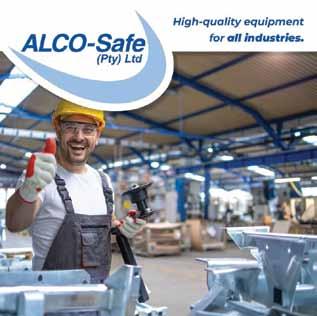
6 minute read
Safety trends
changing behavior for everyone’s safety
By Rhys Evans, MD at ALCO-Safe
Advertisement
Despite concern from South african civil society groups, businesses and legal experts, the department of transport intends to introduce a zero-tolerance drunk driving regulation in the upcoming National road traffic amendment bill. In implementing a total prohibition on the consumption of alcohol by all drivers on South african roads, public interest groups believe that the effect of this provision could be potentially harmful, arguing that the change is unlikely to reduce fatalities, but could instead criminalise the innocent. the main goal of the new law is to promote road safety and reduce alcohol related accidents. alCo-Safe supports this idea entirely. however, it must be pointed out that what we need to deter unsafe driving behaviour isn’t only stricter laws, but rather enhanced application of the rules and visible enforcement.
MORE ThAN lEgISlATIVE ChANgE NEEDED
by deleting any reference to alcohol content in the blood or breath specimen, the amendment bill seeks a total prohibition on alcohol consumption for all drivers. the need for change is obvious when considering drunk driving incidents cost the economy an estimated r18.2 billion annually and account for 27.1% of fatal crashes on local roads. however, it is worth noting that South africa’s laws on drinking and driving are already strict and in line with worldwide best practices. this zero-tolerance amendment, combined with the new demerit system for drivers under the administrative adjudication of road traffic offences (aarto), could see motorists penalised with up to 6 demerit points for a positive breathalyser result. after 15 demerit points, their license will be suspended for three months for every point over the threshold, which could severely impact the driver’s livelihood during the suspension period.
IN DEPTh COMPETENCy TRAININg AND CERTIFICATION IS ESSENTIAl
While the rationale for reducing the permissible blood alcohol level to 0% is understandable, the enforcement thereof becomes problematic if the officers entrusted with enforcing the new law have not undergone extensive training. the training must include in-depth information on alcohol in the body, how it absorbs into the body and how it is removed from the body. another important factor that officers need to understand is what substances contain alcohol that could potentially lead to a mouth alcohol positive test rather than a blood alcohol positive test. alcohol coming from the mouth is not indicative of intoxication. therefore, it’s important for those enforcing the new laws to properly understand the difference between alcohol coming from a person’s mouth and alcohol coming from the blood in a person’s lungs. a motorist tested at a roadblock could yield a false positive result unwittingly due to certain cough medicines, toothpastes or food products that contain trace amounts of alcohol if they are tested by untrained officials. untrained officers are less likely to understand the laws and why they are in place. they are most likely going to be less confident in what they are doing, and therefore more likely to be convinced to take bribes rather than follow the correct procedures.
Rhys Evans
ACCuRATE, CONSISTENT ENFORCEMENT
there is room to argue that we should rather analyse why the current system is failing and address those problems before passing a new law that will be hampered by the same problems as the old laws and possibly new problems as well. We don’t necessarily need harsher laws to reduce dangerous driving behaviour. Instead, we need to increase the effectiveness of enforcement. this involves measures such as 24/7 traffic policing and testing motorists by means of regular roadblocks, all year round, not just during the festive season. active monitoring of the officers conducting the testing is needed to make sure they are not taking bribes is of utmost importance. It doesn’t matter if you have a zero-alcohol limit if the officers trusted to enforce the limit would rather take a bribe. the legal level then becomes completely irrelevant. With a zero-level alcohol tolerance, bribery becomes so much easier and enticing for officers. When it comes to testing
motorists for alcohol in a roadblock, or after an accident, breathalyser tests deliver accurate results much faster than blood tests. because the breathalyser tests the air that comes from arterial blood in the lungs which supplies the brain, it is a good indication of the blood alcohol concentration currently affecting that person’s brain, showing how intoxicated that person might be.
Essentially, the letter of the law should not be overlooked in pursuit of an outcome that could be more effectively achieved through application of the law itself. the threat of punishment alone is insufficient to deter irresponsible road usage and getting motorists to think twice before drinking and driving will necessitate visible enforcement, proper testing and consistent policing in order to be properly effective. n
creating safe workspaces
how do organisations provide a safe workplace? keeping intoxicated employees out of the workplace requires clear anti-intoxication policies coupled with strict enforcement through employee testing. For alcohol, breathalysers are the most effective means of testing for intoxication and for substance abuse, saliva testing can provide immediate results detecting recent consumption effective within minutes after the use of drugs. Saliva testing is seen as less intrusive than urine testing and also more effective at determining recent consumption. Furthermore, the use of an oral swab to wipe the inside of the cheek means there are fewer privacy issues with this testing method, compared to urine collection.
Most importantly, however, is how you engage your staff with your policy. In order to create safety, staff need empathy and the knowledge that this is an inclusive, non-threatening process. Staff cannot hear enough about how your policies, how confidentiality works, and the options available to those seeking help. the cost helping a teammate get better is always less than replacement, and the ripple effect of trust and buyin around help also opens many doorways for all concerned.
PAy ATTENTION TO ThE uNDERlyINg PROBlEM
Strict enforcement of anti-intoxication policies in the workplace should be counterbalanced by measures that seek to identify and address the underlying issue of substance abuse. this is particularly important right now given the collective mental fragility of our younger population, as draconian implementation of substance testing and disciplinary action will only cause employees to be more devious in their attempts to conceal their substance abuse problem. Employee assistance programs (Eap) in the workplace can be an effective means for individuals to come forward and admit to substance dependency and ask for help in dealing with their problem, without fear of disciplinary backlash. the specifics of each Eap initiative will vary from organisation to organisation - some assist employees by sponsoring their rehabilitation, but at the very least the individual should be afforded paid sick leave, making it possible for them to seek treatment. In addition to such a confidential facility, organisations need to prioritise the mental wellbeing of their workers, while educating and creating awareness around the dangers of substance abuse and the available options for treatment and recovery.
EVEN TOughER TIMES AhEAD
as difficult as it may be to face, life is going to get a lot harder for South africans as we continue to deal with the impact of a pandemic that shows no signs of disappearing. access to state-provided mental health support is extremely limited in Sa, which means that businesses will be required to step up during these tough times and prioritise the wellbeing of their workers. this is important not only from an occupational health and safety perspective, but from a business continuity perspective - people are the most important asset in any business, and right now those assets need additional support and assistance. n
Contact: rhys Evans, Managing director of alCo-Safe tel: +27 (0)12 343 8114 | rhys@alcosafe.co.za












